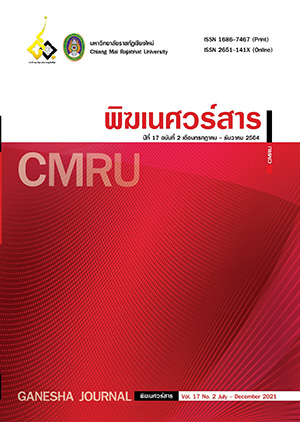The English Grammar Usage of Business English Students, Dhonburi Rajabhat University
Main Article Content
Abstract
The purposes of the study were 1) to study Business English students’ English grammar usage; 2) to investigate which areas of English grammar students need to improve and 3) to investigate whether or not students can apply English grammar in different situations. The subjects were 164 Business English students, Dhonburi Rajabhat University, studying from the first year to the fourth year of study in the first semester of 2018. The data were collected by means of a test with 36 questions consisting of 8 topics: tense, part of speech, relative pronoun, quantity word, verb or adjective, adjective or adverb, infinitive or gerund verb and translation. The percentage was used to analyzed and interpret the data. The result showed that 38 students (23.17%) out of 164 students pass the test. The number of students who passed each topic could be broken down as follows: 9 students (5.49%) for tense; 87 students (53.05%) for part of speech; 89 students (54.27%) for relative pronoun; 127 students (77.44%) for quantity; 28 students (17.07%) for verb or adjective; 91 students (55.49%) for adjective or adverb; 103 students (62.80%) for infinitive/or gerund and 31 students (18.90%) for translation. The 3 most serious English grammar usage which more than 80% of students did not pass are tense, verb or adjective and translation. These students need to put more efforts in studying English grammar especially the 3 problem topics. At the same time teachers need to find appropriate strategies for students to remember the grammar rules including being able to use English in the real situations
Downloads
Article Details

This work is licensed under a Creative Commons Attribution-NonCommercial-NoDerivatives 4.0 International License.
The articles published are copyrighted by the Graduate School, Chiang Mai Rajabhat University.
The opinions expressed in each article of this academic journal are solely those of the individual authors and do not reflect the views of Chiang Mai Rajabhat University or its faculty members. The responsibility for the content of each article rests entirely with the respective authors. In the event of any errors, the authors alone are responsible for their own articles.
References
DRU academic section. (2015-2017). Grade for English structure, semester 1/2015, 1/2016 and 1/2017). Retrieved from https://reg.dru.ac.th/registrar/login.asp
Ellis, R. (2006). Current issues in the teaching of grammar: An SLA perspective. TESOL Quarterly, 40(1), 83-107.
Graham, S. (2008). Why Thai students do not like learning English. Retrieved from http://www.steves-english-zone.com/archived-news/173-why-thai-students- do-not-like-learning-english.html
Khumphee, S., & Yodkamlue, B. (2017). Grammatical errors in English essays written by Thai EFL undergraduate students. Journal of Education Mahasarakham University, 11(4), 139-154.
Noom-ura, S. (2013). English-teaching problems in Thailand and Thai teachers’ professional development needs. English Language Teaching, 6(11), 139-147.
Saengboon, S. (2017). English grammar and Thai university students: An insurmountable linguistic battle?. Canadian Center of Science and Education, 11(11), 22-36.
Srinon, U. (2019). Perceptions of grammatical items by Thai EFL students in an English grammar foundation course. Veridian E-Journal, Silpakorn University, 12(5), 695-710.
Srisuruk, P., & Siri, P. (2018). Pragmatic competence in sensitive situations in English by Thai university students (A ase study of business English and tourism industry students from Dhonburi Rajabhat University). Dhonburi Rajabhat University Journal, 12(2), 110-126.
Sukasame, N., Kantho, S. and Narrot, P. (2014). A study of errors in learning English grammatical structures on tenses of Matthayomsuksa 4 students of the demonstration school, KhonKaen university. Retrieved from https://www.researchgate.net/publication/269846153_A_Study_of_Errors_in_Learning_English_Grammatical_Structures_on_Tenses_of_MatthayomSuksa_4_Students_of_the_Demonstration_School_KhonKaen_University
Wiens, K. (2012). I won’t hire people who use poor grammar: Here’s why. Retrieved from https://hbr.org/2012/07/i-wont-hire-people-who-use-poo


